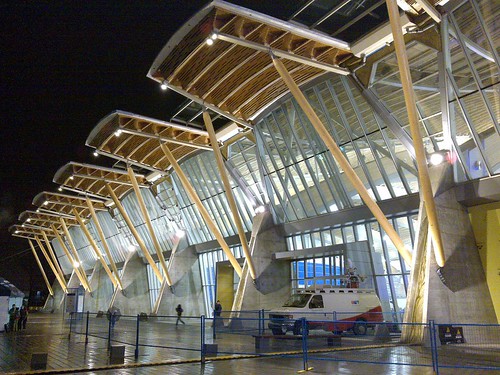But the reality seems far from that.
First there is the question of what the actual emission from the games will be. VANOC commissioned the David Suzuki Foundation (DSF) to do the calculations. They came out with a total of over 328,000 tonnes. But the actual number is certainly higher.
Although DSF tried to verify as many of the number as possible some of the estimates that they used came directory from the IOC and they were not able to independently verify their accuracy. There were also several categories where they were not able to produce any estimates (for example, fugitive refrigerant emissions, test events and Athletes and Team Officials shipping) so these emissions were not included in the total.
But even if you take the 328,000 figure VANOC is far from neutralizing those emissions. Only about 118,000 tonnes have been offset so far.
And as the Olympics approach there are some unexpected emission sources. At Cypress Bowl straw, wood chips and snow are having to be shipped in. And it seems that the emissions from electrical use will be higher than expected as VANOC opts to use diesel generators instead of BC Hydro's cleaner power.

 General Motors is a national partner for the games, and one of the leading corporate opponents of effective action on climate change. Only two years ago, a vice-chairman of GM called global warming a "total crock of shit." GM is supplying a large fleet of vehicles for the games, many of which are gas-guzzling SUVs.
General Motors is a national partner for the games, and one of the leading corporate opponents of effective action on climate change. Only two years ago, a vice-chairman of GM called global warming a "total crock of shit." GM is supplying a large fleet of vehicles for the games, many of which are gas-guzzling SUVs.  Petro-Canada, another National Olympic Partner, is the retail arm of the largest extractor of Oil Sands bitumen. The Oil Sands are Canada's biggest ghg emissions point source.
Petro-Canada, another National Olympic Partner, is the retail arm of the largest extractor of Oil Sands bitumen. The Oil Sands are Canada's biggest ghg emissions point source. RBC (the Royal Bank of Canada) in addition to being a prominent Olympic sponsor is the largest commercial bank funder of the Oil Sands. TransCanada pipelines, whose pipelines connect to the Oil Sands, is also an official supplier.
RBC (the Royal Bank of Canada) in addition to being a prominent Olympic sponsor is the largest commercial bank funder of the Oil Sands. TransCanada pipelines, whose pipelines connect to the Oil Sands, is also an official supplier. 
 ion for the Olympics. These plans include the controversial Gateway Program. It continues to heavily subsidize the oil and gas industry which resulted in it being the only Canadian province to see ghg emissions from industrial sources increase in 2008.
ion for the Olympics. These plans include the controversial Gateway Program. It continues to heavily subsidize the oil and gas industry which resulted in it being the only Canadian province to see ghg emissions from industrial sources increase in 2008.  A coalition of environmental activists led by GatewaySucks.org is calling on climate change activists to join the convergence at the 2010 Olympic Games in Vancouver.
A coalition of environmental activists led by GatewaySucks.org is calling on climate change activists to join the convergence at the 2010 Olympic Games in Vancouver. 












